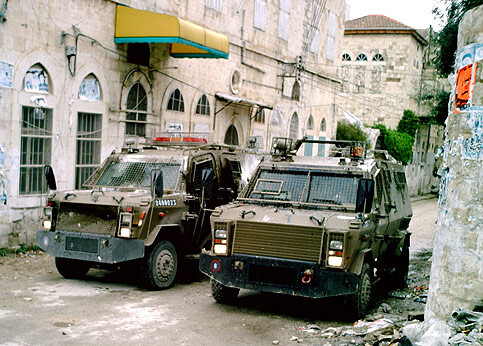News from Within 18 March 2007

Two Israeli armoured vehicles block one of the main entrances to Nablus’ Old City. (Kirsten Sutherland)
The most recent Israeli invasion of Nablus, dubbed operation “Hot Winter,” ended on 1 March. A couple days later in the early morning hours, a few of us entered the city and headed to the Yasmina Hotel to meet a local man, Mohammed, who works with the International Solidarity Movement and had arranged for us to meet with some individuals who could explain their experiences during the Israeli sweep.
While we sit down for coffee, Mohammed gives us a briefing of the facts: two men were killed, 35 injured and 150 detained. Many houses were occupied, shops were blown up and there was a 24 hour a day curfew over the old city, which had been declared a closed military zone. The Turkish Baths, a significant building for the economy as well as of historical significance, was occupied by the military and then destroyed.
He leads us into the old city, where the narrow streets are now bustling with people. This city had been empty, except for the Israeli military, internationals and medical teams. Posters for “martyrs” cover the walls of the city, from this invasion and past. There is a notable difference in the faces of the local people, they appear frustrated and downtrodden.
Mohammed shows us a shoe factory that had been blown up, as the Israeli military claimed it was a bomb making factory. Including the shoe factory, the Israeli military alleged to have discovered a total of four “bomb factories.” Mohammed contends that the Israeli military had knowledge that it was nothing more than a shoe factory, but blew it up and claimed victory as an efficient way to destroy the city’s economy.
As we continued down the street, an old man sitting outside his bakery stops us, yelling in Arabic. Mohammed tells us that the man would like to show us what happened to his shop, the Tubani Bakery, during the invasion. He takes us into the back of the shop where the floor has been destroyed; the Israeli military dug it up, alleging that terrorists were hiding beneath. In addition, they accused him of making bombs with a box of rusted metal parts. The baker explains to us they are old parts of his large oven. We pass by the oven on the way out and the baker hands us freshly baked bread.
Yet despite the recent hardships, the people of Nablus remained quite hospitable.
Once more we travel down the very narrow street, past another man who tells us the story of his ten year old daughter. Her name is Jihan Nimar Shaeen Dadoush, and she was taken by soldiers and questioned for hours about the whereabouts of the wanted men and where the explosives were stashed. Mohammed asserts that, as ridiculous as it may sound, the Israeli military believes the entire city is in on some master plan and that all residents, no matter how young or old, have information they want.
We continue walking until we reach a house where we are warmly welcomed. We sit down in the living room and are informed that this house was occupied during the invasion. The children running around us, giggling; the trauma they recently experienced nonevident.
The man tells us his story, through Mohammed as a translator. Israeli soldiers entered at three in the morning and began interrogating the man and his family. He was questioned repeatedly about his family and his neighbors, as well as the actions of his son Islam, who the soldiers believed to be a teen, but is actually only five years old. According to his testimony, the man was forced to go up and down the stairway of his house while being kicked and punched in the stomach and groin. The soldiers left, yet returned the next morning with large dogs for use in searching the house. Again the man was interrogated; they asked him where the guns were and he took them into the kitchen, stating “This is my gun. Tomato, potato, onion and cucumber. Who’s going to feed those kids? Neither Olmert nor Arafat nor Abbas, they gonna feed my kids. This is my gun.”
Roughly ten soldiers stayed in his house for a few days, interrogating him for hours. During this time they forced the man to escort them to the rooftops of the highest buildings, where they believed Palestinian fighters would be hiding. The troops also had the man escort them to a home of two elderly people, who were also forced out of their home despite their ill health.
We continue on to the home of Rahib Abdil Rani Salhab, one of the men killed during the invasion. It is surprising how quickly posters are made in his honor, and plastered everywhere from the front of his car, the entrance to his home to the walls of his family’s living room. Sitting with his wife, she is asked how she is coping and responds ‘Alhamdulellah’(Thanks goes to God); pointing to the poster of her husband. Salhab was a tailor; the couple has three boys and two girls. One of the girls is disabled, having lost the ability to walk as a child after becoming ill.
The extended family gathers around in the small room to share their story of grief. His wife is only able to say a few words about her husband before she begins to cry, “He was 46 years old and he was so kind to his family. He would always take his disabled daughter to the doctor. He had so many friends and he was loved by his family.”
His eldest son gives us the details about his father’s death. During the invasion the Israeli military occupied a nearby building. Without warning, concussion grenades were employed and tear gas was shot into the family’s home. Salhab, who had asthma, was in the bathroom when the tear gas filled his home. He was found face down on the floor; first aid was applied as an ambulance was called. “It took half an hour because they detained the ambulance,” explains his son. Once the ambulance had picked up Salhab and reached the hospital, they were again detained, “The hospital was occupied by the army, no one could get in and no one could get out, they [the Israeli soldiers] have to check. Even the patients,” he explains, “So they detained them again for nearly half an hour or twenty minutes at the gates.” Once they were able to get Salhab to the ICU, it was too late, the doctor informed the family he was brain dead. After a week of being on life support, Salhab passed away.
We go back to the Yasmina Hotel to meet with Ala Abu Rmeleh, who was working with the United Palestinian Medical Relief Committee when he was arrested by soldiers and detained on the basis of being on a wanted list. Abu Rmeleh tried to enter the old city, after getting a call saying there were people in need of medical assistance. The Israeli military denied him entry, but allowed two other female staff to pass. The soldiers then took Abu Rmeleh’s identity card and told him he was a wanted man. “So, immediately, two soldiers came from the jeep, tied his hands, covered his eyes and put him inside the jeep for two hours,” says Mohammed, again acting as a translator. “After two and a half hours inside the jeep, he lost consciousness and couldn’t breathe.”
After an international group of volunteers questioned the soldiers as to why Abu Rmeleh had been abducted, he was removed from the jeep and left on the ground in the rain. A doctor was called and Abu Rmele was given treatment so he began to feel better. The medical team wanted to take him to the hospital in Nablus, but the army refused. “They took him to one of the houses, and a couple of minutes later one of the commanders came with an Israeli ambulance and took him,” says Mohammed for Abu Rmeleh. He was transported to Huwarra military base, where he was seen by an Israeli doctor and then put with other men who had been arrested. “Some soldiers came and began beating them, you know, as no one can protect them. So they were beating them, him and the other people who were there. A couple of hours later, at 12:30 exactly, they release them,” says Mohammed. During the nearly ten hours of his detention, Abu Rmeleh was not allowed to use the washroom. Afterwards he was told there was a mistake; his ID was very similar to that of a wanted man. He was subsequently given a paper which said he was allowed to get back into Nablus.
Our final destination is the local hospital. There is no trace left of the soldiers who so recently occupied the building. We meet with Dr. Hussam Wahid Aljohary, the head of the hospital, who informs us that the hospital has been occupied twice now by the Israeli military. The soldiers told the doctor they would be checking the ID’s of everybody in the hospital. “I informed them we have patients who are going to receive chemotherapy, dialysis, etc. We are dealing with dangers (for) patients and any delay in getting this treatment, you will be responsible,” says Dr. Aljohary. “He told me ‘We will not delay anybody, we will just check them’.” By the first day, the hospital was dealing with tear gas in the building, subjecting very ill patients to the gas. By getting the word out to NGOs willing to help, they were able to get the Israeli military to refrain from shooting tear gas inside the hospital. The Israeli soldiers checked the ID’s of all the staff and patients, and also thoroughly inspected the ambulances, “It was a very difficult situation,” says Dr. Aljohary, “We hope that it will be the last (invasion) but I’m not optimistic.”

Related Links


